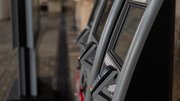Article
Kiosk touchscreen sanitation study unlikely to bring regulatory action
The discovery of bacteria-contaminated touchscreens on McDonald's self-order kiosks in the U.K. has alarmed some observers, but U.S. regulatory officials don't expect the introduction of new requirements to address the problem. However, experts do agree that strict sanitation practices are important for restaurants.

December 5, 2018 by Elliot Maras — Editor, Kiosk Marketplace & Vending Times
There is little chance that the bacteria discovered on McDonald's touchscreens in the U.K. will prompt federal regulatory action in the U.S. since the federal agencies overseeing food — the Food and Drug Administration and the U.S. Department of Agriculture — delegate restaurant safety inspections to state and local agencies.
The FDA has no regulations specific to touchscreens in restaurants, FDA spokesperson Peter Cassell told Kiosk Marketplace when asked about the recent reports of bacteria in the U.K.
Federal action unlikely
Don Zink, a 14-year FDA veteran who served as the chief scientist for the agency's Center for Food Safety and Applied Nutrition, said in an interview with Kiosk Marketplace that he does not see the federal government taking regulatory measures with respect to ordering kiosk touchscreens.
Zink, who holds a Ph.D. in biochemistry and biophysics and is currently president of the division of foods and regulatory compliance at IEH Laboratories and Consulting Group, said that restaurants in the U.S. typically are regulated by state and local health departments.
The FDA has no jurisdiction over touchscreens, he said. "It's not food. The kiosk touchscreen is a surface in the restaurant that is typically touched by patrons, much like a doorknob or countertop. The FDA regulates food, food additives and food contact materials, not touchscreens."
The FDA has issued guidance on how consumers should use smartphones and tablets in the kitchen. A guidance document the FDA provided to Kiosk Marketplace says there is no evidence such devices have caused foodborne illnesses, but that more research is need to better understand the actual risk to consumers from using them while preparing food.
State and local action unlikely
As for actions that state and local governments might take, "The state and local health departments have usually focused on the food," Zink said. This would include concerns such as sanitation in food preparation, temperature control and hygienic practices of workers.
"They also look at restroom sanitation, but that's usually visual," he said. "I have never heard of a health department sampling for microorganisms on faucets, door knobs … any of those kinds of things, to see if they were sanitary."
"(To) the extent that local health departments see this (McDonald's) article, they might start raising it as a question when they do their inspections," Zink said.
To date, state and local governments have not mandated sanitation requirements specific to kiosk touchscreens, said Corinne Costello, operations coordinator at Generation Next, a company that franchises self-serve frozen yogurt and ice cream kiosks nationwide under the Reis & Irvy's brand. Costello has worked with health departments in 28 states and 50 municipalities.
"Most of the time, they're focused on food contact surfaces," Costello said.
As a franchisor of self-serve foodservice kiosks, Generation Next has taken a proactive approach to sanitation. The kiosk manufacturer recommends a minimum cleaning every seven days. California, one of the stricter states, requires cleaning once every three days. The kiosks are also approved by NSF International, an independent tester and auditor that stipulates its own sanitation requirements.
Generation Next requires its machine servicer, CSA Solutions, to apply Hydra Rinse sanitized wipes containing citric acid to the touchscreen along with the rest of the exterior with every service visit, Costello said.
"[Bacteria contamination] obviously concerns us, but it also validates why we've taken so many extra measures to ensure that that never happens to us," said Nik Wright, vice president of operations at Generation Next.
Sanitation measures needed
"Anyone running a public space should probably have a program of cleaning and sanitizing things like door handles, door knobs…anything people touch on a regular basis," Zink said. This is particularly true of restaurants where it is important to prevent the spread of Noovirus infection.
"This isn't a surprise," he said regarding the bacteria discovered on McDonald's touchscreens. "There have been studies in the past of bacterial contamination of surfaces in public restrooms and even office desks." He pointed to articles written by Dr. Charles Gerba of the University of Arizona for examples of these types of studies.
"That's kind of a normal problem," Zink continued. "My sense is that public health authorities will not be greatly surprised or alarmed. Knowing McDonald's, they're going to react to it and start sanitizing those screens with some increased frequency, but again, this is not a surprising problem at all."
"I see this story as a big non-story," said an attorney who specializes in food safety who did not want to be identified. "How much more can they (McDonald's) do? Every time you clean it, someone else is going to come in and touch it again."
"It would be a story if it showed their employees were not washing their hands," the attorney said.
The National Restaurant Association's ServSafe sanitation guide states that "nonfood contact surfaces" need to be cleaned regularly but do not need to be sanitized, according to a copy of the document emailed to Kiosk Marketplace. These surfaces need to be cleaned regularly to prevent food residue, dust and dirt from building up in order to prevent pests and pathogen growth, the document says.
About Elliot Maras
Elliot Maras is the editor of Kiosk Marketplace and Vending Times. He brings three decades covering unattended retail and commercial foodservice.
 ChatGPT
ChatGPT Grok
Grok Perplexity
Perplexity Claude
Claude









